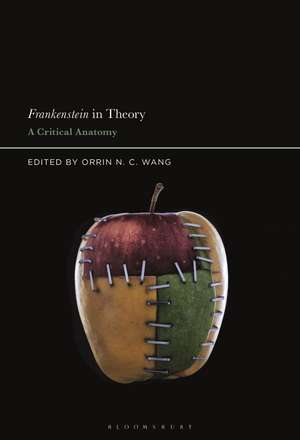Frankenstein in Theory: A Critical Anatomy
Editat de Prof Orrin N. C. Wangen Limba Engleză Paperback – 27 iul 2022
| Toate formatele și edițiile | Preț | Express |
|---|---|---|
| Paperback (1) | 198.30 lei 6-8 săpt. | |
| Bloomsbury Publishing – 27 iul 2022 | 198.30 lei 6-8 săpt. | |
| Hardback (1) | 569.37 lei 6-8 săpt. | |
| Bloomsbury Publishing – 13 ian 2021 | 569.37 lei 6-8 săpt. |
Preț: 198.30 lei
Preț vechi: 258.14 lei
-23% Nou
Puncte Express: 297
Preț estimativ în valută:
37.95€ • 39.72$ • 31.58£
37.95€ • 39.72$ • 31.58£
Carte tipărită la comandă
Livrare economică 31 martie-14 aprilie
Preluare comenzi: 021 569.72.76
Specificații
ISBN-13: 9781501372209
ISBN-10: 1501372203
Pagini: 272
Ilustrații: 2 bw illus
Dimensiuni: 152 x 229 x 19 mm
Greutate: 0.37 kg
Editura: Bloomsbury Publishing
Colecția Bloomsbury Academic
Locul publicării:New York, United States
ISBN-10: 1501372203
Pagini: 272
Ilustrații: 2 bw illus
Dimensiuni: 152 x 229 x 19 mm
Greutate: 0.37 kg
Editura: Bloomsbury Publishing
Colecția Bloomsbury Academic
Locul publicării:New York, United States
Caracteristici
Affirms the power of Frankenstein as an inexhaustible work of literature that engages contemporary debates in aesthetic thought, philosophy, and social theory
Notă biografică
Orrin N. C. Wang teaches English and Comparative Literature at the University of Maryland, College Park, USA. He is the author of Fantastic Modernity: Dialectical Readings in Romanticism and Theory (1996) and Romantic Sobriety: Sensation, Revolution, Commodification, History, winner of the 2011 Jean-Pierre Barricelli Prize.
Cuprins
List of FiguresAcknowledgmentsIntroduction: Frankenstein in Theory Orrin N. C. Wang (University of Maryland, College Park, USA) 1. Last Words: Voice, Gesture, and the Remains of Frankenstein David L. Clark (McMaster University, Canada)2. When Jane Met Mary; or, Frankenstein's Romantic ComedySonia Hofkosh (Tufts University, USA)3. Frankenstein's Embodied Imagination: Or, the Limits of Embodied CognitionRichard C. Sha (American University, USA)4. Non-Binary Frankenstein?Chris Washington (Francis Marion University, USA) 5. What's Love Got to Do with It? Frankenstein and Monstrous PsychoanalysisJoel Faflak (University of Western Ontario, Canada) 6. The "very creature he creates": Frankenstein in the Making of Moby-DickSamuel Otter (University of California, Berkeley, USA) 7. Finitude, Frames, and the Plot of FrankensteinYoon Sun Lee (Wellesley College, USA) 8. Blackness and Anthropogenesis in FrankensteinRei Terada (University of California, Irvine, USA) 9. Mediating Monstrosity: Media, Information, and Mary Shelley's FrankensteinAndrew Burkett (Union College, USA)10. "A daemon whom I had myself created": Race, Frankenstein, and MonsteringPatricia A. Matthew (Montclair State University, USA)11. The Smiles That One Is Owed: Justice, Justine, and Sympathy for a WretchErin M. Goss (Clemson University, USA)12. The Utopias of FrankensteinVivasvan Soni (Northwestern University, USA) 13. Is That All There Is? No Regrets (after 1818)Jacques Khalip (Brown University, USA)14. Frankenstein in Practice (as Theory)Sara Guyer (University of Wisconsin, Madison, USA) Notes on ContributorsIndex
Recenzii
A sense of urgency runs through all these essays, persuading us that Frankenstein and his monster matter now. It's not just that present crises help us think anew about Shelley's novel, or that it continually challenges the theories we employ. This provocative collection makes the case that Frankenstein compels us to think rigorously about our historical present.
A superb collection of essays, which reanimates not only this masterpiece of Romantic writing but also the theoretical debates that have shaped Romantic criticism for decades. In keeping with its subject, this is a daring, creative, and provocative contribution to Shelley scholarship.
This groundbreaking volume gathers together the best and most timely scholarship on Mary Shelley's timeless masterpiece. The theoretical perspectives are wonderfully diverse-including monster theory, ecocriticism, corporeality studies, trans studies, with many permutations and cross-pollinations in between. This will be an essential text for teaching Frankenstein for educators going forward. Frankly, this volume is alive!
A superb collection of essays, which reanimates not only this masterpiece of Romantic writing but also the theoretical debates that have shaped Romantic criticism for decades. In keeping with its subject, this is a daring, creative, and provocative contribution to Shelley scholarship.
This groundbreaking volume gathers together the best and most timely scholarship on Mary Shelley's timeless masterpiece. The theoretical perspectives are wonderfully diverse-including monster theory, ecocriticism, corporeality studies, trans studies, with many permutations and cross-pollinations in between. This will be an essential text for teaching Frankenstein for educators going forward. Frankly, this volume is alive!
